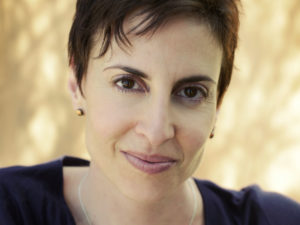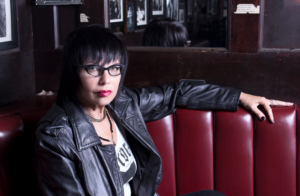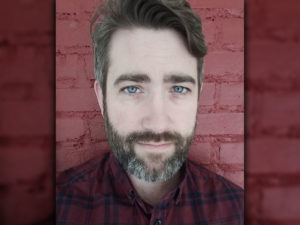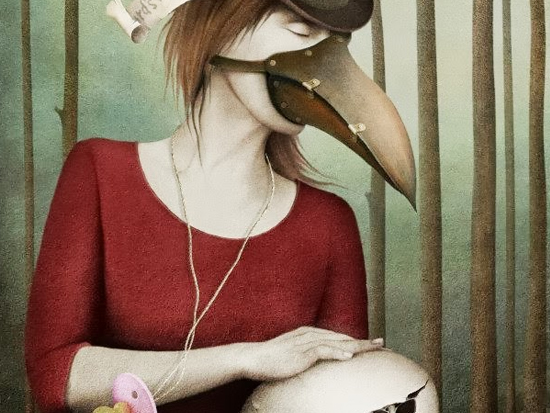
April Michelle Bratten is a writer currently living in Minot, North Dakota. Her work has been published widely in both print and online journals. A few of her credits include Southeast Review, The Waterhouse Review, The Blue Hour Magazine, Beat the Dust, Thrush Poetry Journal, Santa Fe Literary Review, and The Fat City Review, among others. April received her BA degree in English from Minot State University and she is one of the founding and managing editors for Up The Staircase Quarterly, a literary journal online. Her chapbook, Raw Dogs and Other Metaphors, was released in 2012 from Maverick Duck Press.
First Kiss
Sloppily, immaturely,
in front of a pristine mirror
in the men’s bathroom of my Baptist church,
I let that froggy-boy kiss me.
I remember the subtle
look of bewilderment in my eyes
as I clutched the wet sink
and allowed him to dive at me
with tongue and springy eye.
He did it without grace,
without the dented smell
of a flower in my pocket.
As he groped the front of my jeans,
I thought about that summer
Hurricane Hugo destroyed my family’s
townhouse in Charleston.
We had to drag our belongings
through the grass and mud
to a new place,
smaller, ruder,
and somehow considerably more unstable.
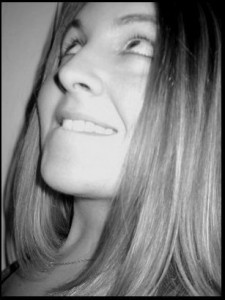 This piece, presuming you are the narrator, is obviously a distant memory. Can you discuss how the piece came to fruition? What sparked the memory?
This piece, presuming you are the narrator, is obviously a distant memory. Can you discuss how the piece came to fruition? What sparked the memory?
The majority of the poems that I wrote between 2009 and 2012 were memory poems, many of which ended up in It Broke Anyway. I visited with an old high school friend during this time who was interested in what I had been writing about. When I told him that my focus was mostly on my early adulthood and childhood memories, he became very enthusiastic. He wanted to know which of our middle and high school adventures made it into my writing. The truth was that none of them had. I skipped over that entire period of my life. He told me I was crazy for ignoring an integral part of my life, a time mixed with religious confusion, burgeoning sexuality, rebellion, and self-discovery. The complexity of this time might have been why I waited to write about it for so long. I wrote this poem, “First Kiss”, and a handful of others concerning that time, a few days after that conversation. The memories invaded me and simply would not leave me alone until I wrote about them. So, thanks, Josh Carlson, for challenging me to write about something I had been avoiding!
Can you talk about the juxtaposition with hurricane Hugo and how this came into the piece and the connection between the two events?
Hugo was the second hurricane I experienced, and I was only seven years old when it hit Charleston. It was also the second hurricane that forced my family to relocate. After Hugo, our home was not suitable to live in. We moved to another townhouse in the same neighborhood, in walking distance from our old home. We carried our things and walked to the new place. I remember feeling powerless and confused. I remember how everything was still wet, and how it smelled. It was a scary time for a seven year old, but I had to accept the change, adapt, and move on.
My first kiss happened in the 10th grade, at church. My beliefs about religion were still young and formulating. Mentally, I was stuck between wanting to accept what my friends and family believed, and what I actually believed. The kiss was no fun. The boy had no clue what he was doing, and it was very unpleasant, more so for me than him, I expect. It was a situation that I thought I wanted to happen, but when it began, I quickly realized it was not what I wanted at all. I found myself once again feeling powerless and confused.
Like Hugo, the kiss altered me in ways that I did not understand. It made me grasp for answers to questions I did not understand. It forced me to grow up a little bit more, and made me realize my experiences in life were going to be completely different from what I was expecting.
Can you discuss how location, setting, plays a role in this work and your current work?
In order for me to feel I have successfully written a poem, the atmosphere I create within the piece has to be spot on. Location and setting do not have to be named specifically, but their elements, and the feelings they impart, must come to life. In a lot of my writing, I do tend to specifically state where the poem is taking place, if not by name, then by description. Memory poems in particular, for me, are a tribute to places I have been. Those places helped shape me, and labeling those places, and using those places specifically, makes the memory more vivid, actual. I have lived in many places across the southern United States. I lived overseas for a spell, and now I am in North Dakota. My current focus involves zeroing in on and celebrating the uniqueness of these places.

